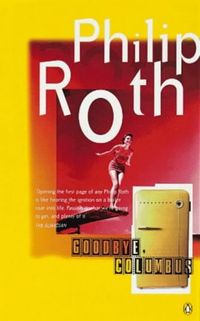
Perhaps it was a little strange that I’d read eleven of Philip Roth’s books, but never his first and (perhaps) most famous. The collection of stories here, the shots heard ’round the work for “self-loathing jews,” are remarkable in many ways. The novella “Goodbye, Columbus,” a finely observed work, deals with class issues, youth, assimilation, the sexual revolution and urban changes is beyond anything else one thing: very funny. It manages to be a perfect snapshot of secular Jewish life in North Jersey in 1959, yet somehow stays universal. Very few of the specific conflicts presented will ring true to anyone today, but the desires and frustrations of the main character still resonate and will continue to resonate, I think, for any young person unsure of where they belong in society’s pecking order.
But some of the other short stories, frankly, are only okay. They are interesting to read because they indicate the writer Roth will become when he matures, but on their own, stories like “Epstein” and “Eli, the Fanatic” are funny but forgettable. “The Conversion of the Jews” and, particularly, “You Can’t Tell a Man by the Song He Sings” are flat-out bad.
The biggest surprise for me (I say surprise because I had seen the rather faithful film adaptation of “Goodbye, Columbus” many years ago) was the story “Defender of the Faith.” And, I can’t deny, I can understand the controversy. In the 1950s, when this story was written, there wasn’t that much representation of Jewish life in mass media out their for American to sink its teeth into. Sure, Mendel Berlinger was cracking them up every night on TV, but after he changed his name to Milton Berle. “Defender of the Faith” tells the story of a Jewish sargent not-so-coincidentally named Nathan Marx, just back from combat in WWII, overseeing a group of trainees at basic training. There, a schnorrer of a man named Grossbart . . .a big vortex of the worst Jewish stereotypes. . .a horror of a shonde for the goyim makes Marx’s life a nightmare. I don’t think I’ve ever cringed more while reading a work of fiction in my life. Roth was condemned by every Jewish group imaginable (this incident comes up quite hilariously in one of Roth’s many quasi-autographical works, specifically “Zuckerman Unbound”) and my instinct, of course, was to defend him. Until I read the story.
Oy, such troubles.
The story is fantastic, by the way. And, if I may repeat myself, very very funny.







